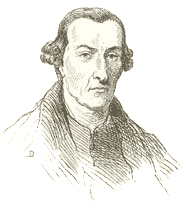Patrick Henry was born in Hanover County, north of Richmond, Virginia. He received little schooling and showed sparse talent for business, failing in early ventures in farming and shopkeeping. In 1760, he started a career as a lawyer and quickly made an impact with his defense of accused criminals. In 1763, Henry moved to the forefront as a champion of colonial freedoms in the case known as the Parsons' Cause. This matter involved the methods of paying Anglican clergymen in Virginia and found Henry arguing against the policies of George III. Using the popular Natural Rights philosophy of the day, Henry maintained that the king had broken the social contract with the people and did not merit their allegiance.
In 1765, Henry was elected to the House of Burgesses and furthered his radical reputation in the debate over the Stamp Act. He compared George III with tyrants of the past, infuriating the more conservative elements who accused him of treason. Henry responded, "If this be treason, make the most of it."
On the following day, the Virginia House of Burgesses adopted four of Henry's proposed resolutions. The third laid out again the theory of "No Taxation without Representation":
In 1763, Henry moved to the forefront as a champion of colonial freedoms in the case known as the Parsons' Cause. This matter involved the methods of paying Anglican clergymen in Virginia and found Henry arguing against the policies of George III. Using the popular Natural Rights philosophy of the day, Henry maintained that the king had broken the social contract with the people and did not merit their allegiance.
In 1765, Henry was elected to the House of Burgesses and furthered his radical reputation in the debate over the Stamp Act. He compared George III with tyrants of the past, infuriating the more conservative elements who accused him of treason. Henry responded, "If this be treason, make the most of it."
On the following day, the Virginia House of Burgesses adopted four of Henry's proposed resolutions. The third laid out again the theory of "No Taxation without Representation":
Resolved, that the taxation of the people by themselves, or by persons chosen by themselves to represent them, who can only know what taxes the people are able to bear, or the easiest method of raising them, and must themselves be affected by every tax laid on the people, is the only security against a burdensome taxation, and the distinguishing characteristic of British freedom, without which the ancient constitution cannot exist.Henry, along with Richard Henry Lee and Thomas Jefferson, helped organize the Committees of Correspondence which exchanged political news and views within the colonies. In 1774, he was selected as a delegate to the First Continental Congress. The next year, at the Virginia Convention, he made the speech containing his most famous statement, "Is life so dear or peace so sweet as to be purchased by the chains of slavery? Forbid it, Almighty God! I know not what course others may take, but as for me, give me liberty, or give me death." Henry commanded militia soldiers at the beginning of the War of Independence, but served most notably in the state government of that time. He was elected governor on five occasions. Following the war he opposed ratification of the Constitution because of his concerns about the impairment of states' rights, but later worked on behalf of the Bill of Rights. Patrick Henry was strongly opposed to the assumption by the federal government of state debts, as proposed by Hamilton in The Report on Public Credit in 1790. He wrote a protest resolution which was adopted by the Virginia Assembly in December, 1790. On account of health concerns, Henry declined nominations from George Washington to become his secretary of state or the chief justice of the Supreme Court. He later served briefly as a U.S. senator and for many years as a Virginia state legislator. Virginia became an independent commonwealth in 1776 and established a new state government. Patrick Henry was elected as the first governor.